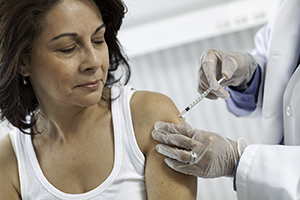Vaccines for People with Asthma
The CDC advises that people with asthma get certain vaccines. Vaccines help the immune system protect against bacteria or viruses to prevent infection.
Flu shot
The flu (influenza) is an infection caused by a virus. The virus spreads from person to person by coughing or sneezing. Flu symptoms may include:
But people with asthma who catch the flu may get very sick. This sometimes leads to pneumonia. In some cases, you may need a hospital stay. You're at higher risk of serious complications. So contact your healthcare provider if you have any flu symptoms.

If you have asthma you should get a yearly flu shot. Keep in mind that the flu shot will help protect you from getting the flu. But it won't reduce asthma flare-ups from other viruses during flu season.
The flu vaccine doesn't provide full protection. It makes it less likely that you will catch the flu for about the next 6 months. You need a new flu shot each year.
The best time to get the flu shot is when it becomes available in your community. This will help make sure that you are protected before flu season starts. It helps if the people you live with get flu shots, too. Don’t get the nasal spray vaccine. It could set off an asthma attack.
Here are some other tips to help you stay healthy:
-
Scrub your hands often and for at least 20 seconds each time.
-
Cover your mouth and nose when you cough or sneeze.
-
Stay away from people who are sick.
-
Don't touch your eyes, nose, and mouth.
-
Clean and disinfect surfaces that may have germs on them.
Pneumonia shot
Pneumococcal disease is a bacterial illness. It can cause serious or even deadly infections of the:
There are two types of vaccines that can help prevent pneumococcal disease. The vaccine that is right for you depends on your age and risk factors. Talk with your healthcare provider about which vaccine is best for you and when you should get it.
The pneumococcal vaccine can't prevent all cases. But it can help protect you from the worst infections.
COVID-19 shot
COVID-19 is a respiratory illness caused by a virus. People with asthma may be at higher risk of severe illness from COVID-19. One of the best things to do to reduce complications of COVID-19 is to get vaccinated. Talk to your healthcare provider about the COVID-19 vaccine and when to get it.
Your healthcare provider may recommend additional vaccines depending on your age and health history. Keep a record of when you receive each of these and other vaccines.